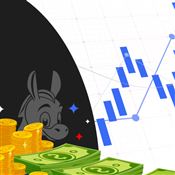Seeking Alpha Premium vs Morningstar Investor
Which is better: Seeking Alpha Premium or Morningstar Investor? Read on to find out which of these trusted names is right for your type of investment.
 |
- Is Seeking Alpha Premium or Morningstar Better?
- What Is Seeking Alpha Premium?
- What Is Morningstar Investor?
- Why Choose Seeking Alpha Premium
- Why Choose Morningstar Investor
- Pricing and Features
- How Are Seeking Alpha and Morningstar Similar?
- How Are Seeking Alpha and Morningstar Different?
- Customer Support
- Seeking Alpha Premium and Morningstar Investor Alternatives
Ever wondered how to actually make money from your investments? Like, which stocks are the real winners? And what about those mutual funds everyone's talking about - how can you tell if they'll actually grow your money?
Seeking Alpha Premium and Morningstar Investor are designed to help you with exactly these questions. But now comes another question: which one's the better platform?
This guide dives into the nitty-gritty. We'll break down the costs and features and compare their similarities and differences. So, if you're all about getting the scoop on who's offering what you need, keep reading!
Is Seeking Alpha Premium or Morningstar Better?
Seeking Alpha works great if you're a stock investor. But if you're a mutual funds investor, opt for Morningstar instead.
Seeking Alpha Premium will help you build a portfolio of stocks and ETFs since you'll get better stock ratings and stock comparisons. You can gain multiple perspectives on a specific company, too, which is useful if you're a research-driven investor.
On the other hand, Morningstar Investor's specialty lies in mutual funds (even though it offers stock analysis). So it's a good option if you plan to build a portfolio of mutual funds with stocks and ETFs. You'll also get a more structured portfolio analysis report.
| Seeking Alpha Premium | Morningstar Investor |
|---|---|
| Cost | |
| $299/yr | $249/yr or $34.95/mo |
| 7-day free trial | 7-day free trial |
| Pros | |
| Easy-to-use app | Useful x-ray and portfolio tools |
| Up-to-date news | Offers multiple fund screeners |
| Variety of information available | |
| Cons | |
| Content can be too technical | Poor customer service |
| Service tends to malfunction | Portfolio is sometimes inaccessible |
| Difficult to cancel subscription | Difficult to cancel subscription |
What Is Seeking Alpha Premium?
Seeking Alpha Premium is one of the subscription plans of Seeking Alpha— an investment research platform with analysis and stock-picking tools. That said, Seeking Alpha primarily reviews stocks and ETFs making it best for stock investors.
You'll get unlimited access to market news and backstage access to the minds of over 7,000 investors. They spill the beans on why they think a certain stock is worth buying or selling. Seeking Alpha's editors just curate the content to ensure quality.
Keep in mind not to use this resource as a "tell me what to buy" type of thing. They're only supposed to guide you in making your own investment decisions.
Seeking Alpha Premium is worth it if you're a long-term stocks investor who needs guidance on which stocks to buy. The platform's stock ratings and analysis can help you make an informed decision. But it's best to try out the free trial first to have a better view of what it offers.
What Is Morningstar Investor?
Morningstar Investor is the premium plan of Morningstar, one of the top sources of research and analysis on mutual funds, bonds, and stocks.
You'll get access to premium content from over 150 in-house analysts.[1] Its proprietary ratings on mutual funds are highly trusted in the industry and even quoted in financial media.
And although Morningstar started with mutual funds, they've expanded their game to include stocks in recent years. So if you're all about building a diversified portfolio, it's a good option.
Morningstar Premium, or Morningstar Investor, is a good option for mutual funds investors. But it also offers analysis on bonds, stocks, and ETFs, making it suitable for mixed portfolios. The X-ray tool can even help you identify your portfolio's strengths and weaknesses. It's useful when making data-driven decisions.
Why Choose Seeking Alpha Premium
Seeking Alpha Premium uniquely offers 3 types of stock ratings: from Seeking Alpha authors, Wall Street analysts, and objective quant system. These tell you whether a particular stock is a good buy or sell, which can help you make investment decisions.
But there is also crowdsourced content from other Premium members. These can be helpful to learn about other investors' market analyses and sentiments.
Why Choose Morningstar Investor
Morningstar is known for its quality investment research, mutual funds ratings, and its handy X-ray tool.
The X-ray tool can help you get an overview of your investments. It provides a detailed evaluation of your portfolio so you can see investment gaps, sector spreads, and stocks overlap.
You'll also get a summary of the geographical spread of your portfolio, so you'll know whether your assets are primarily invested in Europe, US, or other regions.
Check out this investment projection calculator:
Pricing & Features
Seeking Alpha Premium is more expensive than Morningstar Investor, with the plan costing $299/yr.[2] Morningstar Investor costs $249/yr or $34.95/mo.[3] There's not a lot of difference in pricing since you also get similar features.
| Seeking Alpha Premium | Morningstar Investor | |
|---|---|---|
| Premium Content | ✔ | ✔ |
| Stock Recommendations | ✔ | ✔ |
| Stock Ratings | ✔ | ✔ |
| Quant Ratings | ✔ | ❌ |
| Data Visualizations | ✔ | ✔ |
| 10-yr Financial Statements | ✔ | ❌ |
| Portfolio Monitor Report | ❌ | ✔ |
| Investment Screener | ✔ | ✔ |
| Portfolio X-Ray | ❌ | ✔ |
| Educational Resources | ✔ | ✔ |
Here's a deep dive onto the features.
- Stock Recommendations and Ratings
Seeking Alpha Premium and Morningstar Investor offer their lists of top-rated stocks. But unlike Seeking Alpha's 3 types of ratings, Morningstar's stock recommendations have 5-star ratings from their in-house analysts.These ratings are based on whether a stock is undervalued or not. It also depends on the stock's moat and fair value.
If a stock earned a 5-star rating from Morningstar, it means it's highly undervalued. So the stock's price is lower than its inherent value, making it a good buy. - Screeners
Both platforms offer screeners for stocks and ETFs. But only Morningstar offers a screener for mutual funds.Morningstar's Basic Fund Screener screens mutual funds according to rating, performance, or category. It can help you quickly discover funds that match your investing style.
On the other hand, Seeking Alpha lets you create your own screener. You can screen stocks/ETFs according to ratings, author recommendations, performance, or momentum.[4]
- Analysis Tools
Morningstar's analysis features are more robust than Seeking Alpha's. You get a deep dive report from their analysts with their stocks or funds recommendations.Also, Morningstar offers "best investment ideas," which you can sort by category depending on the type of investment you want to make.
Seeking Alpha, however, gains an edge with its ten years of historical financial statements for every stock. And you can access and download what you need right from the platform.
- Portfolio Management
Morningstar's portfolio management is more in-depth than Seeking Alpha's. Seeking Alpha simply lets you track your portfolio and see information on your stocks, including ratings, performance, earnings, dividends, and growth.Morningstar goes beyond the basics. It lets you see the breakdown of your funds' components and shares the geographical distribution of your investments.
- Educational Resources
Morningstar gains another edge over Seeking Alpha with its diverse educational resources. You can get worksheets like goal planning worksheets, budget worksheets, and net worth worksheets.You can also opt for the self-study investing course "Morningstar Investing Classroom."[5]
Seeking Alpha doesn't offer worksheets and courses. You can only read articles that explain investing and financial terms written by platform contributors.
How Are Seeking Alpha and Morningstar Similar?
Seeking Alpha and Morningstar both offer personalized feeds, premium content, account integration, and free mobile apps.
The news and analysis you see on both platforms are customized according to what's in your portfolio. You'll also get commentary and analysis from their analysts. Plus, you get to access their ratings, newsletters, email alerts, and watchlists.
The platform connects all your external accounts as it links to your broker. So, you get to see all your accounts and portfolio in a single platform. The mobile apps can help you view and monitor your portfolio if you're on the go.
How Are Seeking Alpha and Morningstar Different?
Seeking Alpha and Morningstar differ in their offered assets, target audience, and platform contributors.
Seeking Alpha primarily reviews stocks and ETFs, while Morningstar's assets analyses are more diverse. Aside from stocks and ETFs, you'll also get analyses on mutual funds and bonds.
That said, Seeking Alpha caters more to stock investors, while Morningstar primarily serves fund investors.
Also, Seeking Alpha's analysis and articles are produced by its community of analysts, investors, and experts who are Premium members. But Morningstar's contributors are its in-house and handpicked analysts.
Customer Support
Seeking Alpha and Morningstar both have customer service support that you can reach through email or phone.
If you have questions or concerns regarding your subscription, you may reach Seeking Alpha through:[6]
- Email: subscriptions@seekingalpha.com
- Call: 1-347-509-6837
For inquiries or concerns regarding Morningstar Investor, you may contact its customer service through:
- Email: joe@morningstar.com
- Call: 866-229-9449
Seeking Alpha Premium and Morningstar Investor Alternatives
Aside from Seeking Alpha and Morningstar, Zacks and Stock Rover are worth checking out.
1. Zacks
Zacks is an investment research platform that also provides stock analysis, research, and recommendations.
It's primarily known for its extensive collection of consensus earnings-per-share (EPS) estimates.
Similar to Morningstar, Zacks also provides information on stocks, ETFs, and mutual funds. However, it provides limited data on small-cap growth stocks or stocks with limited market capitalization.
Morningstar and Seeking Alpha both provide comprehensive information on these small-cap growth stocks.
2. Stock Rover
Stock Rover is a stock research website focusing on investment screening and analysis. Just like Zacks and Morningstar, Stock Rover also offers reviews on mutual funds, ETFs, and stocks.
You also get access to investment analysis tools, charts, investment data, research reports, screeners, and ratings.
Similar to Seeking Alpha, Stock Rover's Premium plan provides data on a company's 10-year financial history.
Stock Rover even allows you to export its investment research reports so you can send them out to discuss with your broker or financial advisor.
Stock Rover Free
- Comprehensive information on over 8,500 North American stocks
- Coverage of 4000 ETFs and 40,000 mutual funds
- Portfolio management
- Portfolio Brokerage integration for automated syncing of portfolios
- Portfolio dashboard with detailed portfolio performance information
- Activates a 14-day free trial of Stock Rover Premium Plus
Stock Rover Essentials
- Easy comparison of investment candidates via the Stock Rover dynamic table
- Fully customizable financial views and columns
- 275+ metrics with 5 years of detailed historical data
- Easy to use, fast and flexible stock screening
- Portfolio and watchlist tracking
Stock Rover Premium
- Over 100+ additional metrics, 375+ in total
- 10+ years of detailed financial history
- Data export
- ETF and Fund comparison data
- Powerful Stock and ETF screening
Stock Rover Premium Plus
- Over 300+ additional metrics, 700+ in total
- Custom metrics
- Equation screening
- Historical data screening
- ETF screening with 180+ ETF specific metrics
Bottom Line
Seeking Alpha and Morningstar are both highly trusted investment research platforms. Choosing the right platform highly depends on who you are as an investor.
Seeking Alpha Premium is better if your investment portfolio primarily contains stocks. But if your portfolio largely contains mutual funds, you better go for Morningstar Investor instead.
Nevertheless, both platforms provide investment research and analysis to help you make an informed decision.
References
- ^ Morningstar. Analysts, Retreived: 9/8/23
- ^ Seeking Alpha. Subscription Plan Pricing, Retrieved 09/16/2024
- ^ Morningstar. FAQ: What's the price of a subscription to Morningstar Investor?, Retrieved 9/1/2023
- ^ Seeking Alpha. Stock Screneer, Retrieved 9/8/23
- ^ Morningstar. Investing Classroom, Retrieved 9/8/23
- ^ Seeking Alpha. Seeking Alpha subscriptions - cancellation and refund policy, Retrieved 9/8/23
Stock Advisor - $99/year for New Members
*$99 is an introductory price for new members only. 50% discount based on current list price of Stock Advisor of $199/year. Membership will renew annually at the then-current list price.
$20 Investment Bonus
- Open an Acorns account (new users only)
- Set up the Recurring Investments feature
- Have your first investment be made successfully via the Recurring Investments feature
Write to Del Exconde at feedback@creditdonkey.com. Follow us on Twitter and Facebook for our latest posts.
Note: This website is made possible through financial relationships with some of the products and services mentioned on this site. We may receive compensation if you shop through links in our content. You do not have to use our links, but you help support CreditDonkey if you do.
|
|
| ||||||
|
|
|
Compare:











